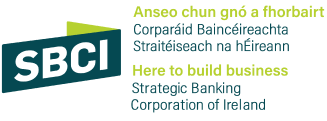These loans are long-term investment towards climate action and environment sustainability.
Businesses wishing to invest in climate action and environmental sustainability may be categorised as one of the following:
- Investment in green/sustainable measures
- Any investment by SMEs classified as a Green / Sustainable Enterprise
- Any investment by farmers classified as a holder of a Green Eco Label
Qualifying climate action and environmentally sustainable loans will receive a discounted interest rate when compared to equivalent loans.
Do you qualify for a Green Discount?
Are you a sustainable enterprise or investing in climate action and environmentally sustainable measures? You may be eligible for a discounted interest rate on your GSLS loan.
The below table provides information on requirements for green discount eligibility.
Requirements for Green Enterprises |
|
Green Eco-Label
(Farming) |
Green Eco Label
(Organic Farming) |
Green Enterprise
non-agri SME |
| Herd number |
X |
X |
|
| Origin Green Membership |
X |
|
|
| ACRES Membership |
X |
|
|
| Organic Licence |
|
X |
|
| >90% Green Revenue* |
|
|
X |
| Accountant letter** |
|
|
X |
| Project technical details |
|
|
|
*Based on activities outlined in Use Case Document
**External accountant letter proving eligible source of income
Green Eco Label (Farming)
Are you a beef or dairy farmer participating in quality assurance or biodiversity schemes? You may be eligible for a discount as a sustainable farmer.
To qualify, borrowers must be members of:
- The Department of Agriculture’s ACRES Tier 1, Tier 2 or ACRES Co-operation
and
- Bord Bia’s Origin Green Beef or Dairy Assurance Schemes
Eligibility will be based on providing a valid herd number linked to the above schemes.
For more information on membership of these schemes please use the below links:
Green Eco Label (Organic Farming)
Are you certified organic by an organic certification body? You may be eligible for a discount as an organic farmer.
To qualify, borrowers must:
- be registered with, and approved as, an organic operator by an organic certification body, and
- be a member of the Department of Agriculture’s Organic Farming Scheme.
Eligibility will be based on providing valid herd number, linked to the Department of Agriculture’s Organic Scheme.
For more information on membership of these schemes please use the link below.
Green Enterprise - SME
Are you an SME engaged primarily in sustainable activities? You may be eligible for a discount as a Green SME.
To qualify, borrowers must:
- generate 90% or more of their revenue from eligible, sustainable activities and
- provide an external accountant’s letter confirming the percentage of “green” activity revenue in the most recent 12-month period for which financial information is available.
Applicants will be required to upload the external accountant’s letter referenced above during the pre-eligibility application on the SBCI Hub.
For a list of sustainable activities, please see the Green SME Use Case Document
For a more information regarding the valid Accountant’s Letter upload, please see the Accountants Letter Template
Begin your SBCI pre-eligibility assessment here
Green Measures
Are you investing in measures to improve your company’s position in relation to climate action and environmental sustainability? You may be eligible for a discount.
To qualify, borrowers must:
- be investing in measures which align with the EIB Group’s parameters for the scheme and
- provide a description of intended measure(s) during your SBCI Hub application
Eligibility will be based on the assessment made during your SBCI Hub application.
Access a list of eligible categories here
View a video describing the SBCI Hub assessment process here
Use Case Document for eligibility of Climate Action and Environmental Sustainability support
Begin your SBCI pre-eligibility assessment here


